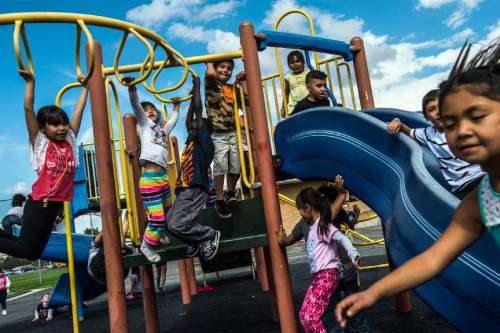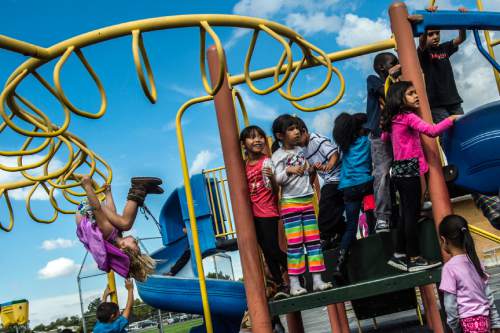This is an archived article that was published on sltrib.com in 2015, and information in the article may be outdated. It is provided only for personal research purposes and may not be reprinted.
Enrolling in high-quality preschool programs helps children enter kindergarten prepared to learn — and you can take that to the bank.
That's the message from the United Way of Salt Lake, which announced Wednesday that a check for $267,000 had been cut for investment bankers who funded public-preschool expansion in Utah.
The payment is the result of a unique pay-for-success financing model, in which private firms foot the bill for public services and are repaid with interest if those services generate cost savings for the state.
Private funding allowed about 600 students to enroll in public and private preschool programs in 2013. Of those students, 110 4-year-olds were expected to need special education during their kindergarten year.
But only one of the students — who are now in the first grade — has required special education, which translates to about $281,000 in cost avoidance for Utah's public education system.
"We're excited about the results," said Andrea Phillips, a vice president in Goldman Sachs' Urban Investment Group, "not only because it means the kids are doing well in kindergarten," but also that "our investment is performing."
Goldman Sachs and J.B. Pritzker committed $7 million to the pay-for-success program, which will fund preschool services for five cohorts of children.
The firms will receive 95 percent of any special-education savings to the state until the investments are repaid with interest.
After that, the firms will receive 40 percent of ongoing cost savings until the participating students complete sixth grade.
"We will continue to track these kids in first grade through sixth grade," Phillips said. "We are optimistic that they will continue to do well in school."
The first round of repayments is being made by United Way and Salt Lake County, which committed $1.3 million in an effort to show lawmakers that the financing model could be successful.
And after passing HB96 in 2014, lawmakers committed to using state funds to repay Goldman Sachs and J.B. Pritzker for the remaining four cohorts.
"Usually it takes a long time to stop funding things that aren't working," United Way of Salt Lake President Bill Crim said. "One of the benefits of pay-for-success financing is you can get a quicker look at whether something is working or not."
The high-quality-preschool model is based on a program administered by Granite School District since 2006.
Granite enrolls about 3,000 3- and 4-year-olds each year, with assessments given to identify the likelihood that a student will require special education, which carries an extra per-pupil cost to the state of $2,607 per year.
Many students, particularly English-language learners and children living in poverty, enter kindergarten behind their peers due to a lack of learning opportunities, according to Brenda Van Gorder, Granite's preschool services director.
"They don't have a learning or a potential gap," Van Gorder said. By no fault of their own, "they're showing up to school not prepared, and it's because of an opportunity gap."
During the first three years of Granite's preschool program, 300 students tested as likely to require special-education services.
But to date, with those children now in sixth, seventh and eighth grades, 12 students have been enrolled in special education.
Van Gorder said younger cohorts have performed as well or better, but precise data is not available until they reach the third grade, when statewide testing begins.
"They're doing great in school," she said. "We'll know how great they're doing when they hit third grade."
Granite School District estimates that its program has saved the state $1.8 million in special education costs. But Van Gorder said there are other potential savings if children succeed in school.
By investing in at-risk youth from an early age, she said, the state could see fewer demands on the juvenile justice system or higher rates of college enrollment and completion.
"Those are all things down the road," she said. "Every single year we've got kids that are a little bit older."
Granite School District enrolls the bulk of the students financed through the pay-for-success model. Other providers include Park City School District, YMCA of Northern Utah, Guadalupe School, Children's Express and Lit'l Scholars.
Phillips said the terms of the investment were based on Granite School District's data. She did not specify what percentage of students avoiding special education is required for Goldman Sachs to break even, but she said the investment would be pay off if the preschool providers match or slightly underperformed Granite's success rate.
"The current outcomes exceeded what our expectations were," Phillips said. "I think a lot of the credit goes to the great team of [preschool] providers."
If students continue to succeed, the state stands to save hundreds of thousands of dollars, even while making payments to Goldman Sachs and J.B. Pritzker, Crim said.
The United Way will not recoup its $1 million, but Crim said money was always intended for preschool services and could be the seed for a long-term program for Utah's children.
"Our mission and our purpose is to solve complex social problems," Crim said. "You don't get those solutions by doing things the same way you've always done it."
Van Gorder said demand for Granite's preschool program has increased as parents and policymakers have seen the benefits of early education.
There has traditionally been political resistance to funding public preschool in Utah, she said, but the pay-for-success model could pave the way for statewide expansion.
"It's almost rejuvenating to be able to be a part of this project," Van Gorder said. "I just hope people can latch onto it and want it to be more prevalent in our state."















